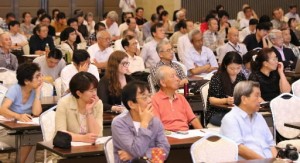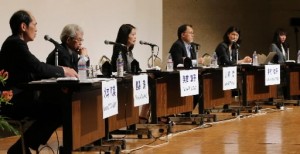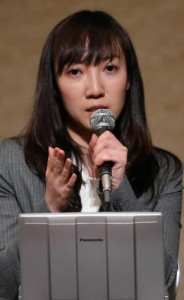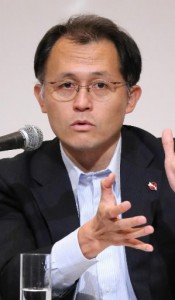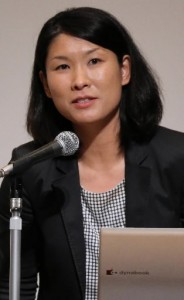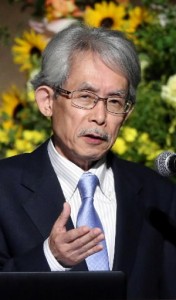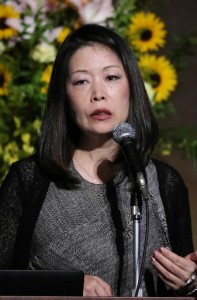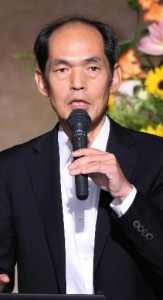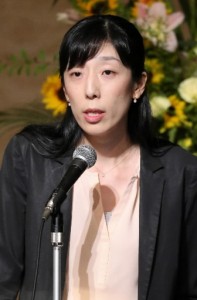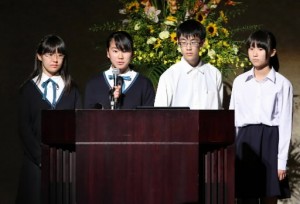International symposium in Hiroshima on nuclear abolition, handing down A-bomb experiences
Sep. 14, 2015
by Saichi Tomizawa, Hiroyuki Taniguchi, Rie Nii, Yumi Kanazaki, and Yuji Yamamoto, Staff Writers
Photos by Manabu Hamaoka
On July 20, an international symposium titled “The 70th Anniversary Year of the Atomic Bombings – Abolishing Nuclear Weapons and Handing Down the A-bomb Survivors’ Experiences” was held at the International Conference Center Hiroshima. Though this spring’s Review Conference of the Nuclear Non-proliferation Treaty (NPT) failed to reach an agreement, the inhumane nature of nuclear weapons was incorporated in the draft of the final document of this conference, which is held every five years. At the symposium, discussions were held on the path leading to the abolition of nuclear arms, and the challenges involved in this quest. The participants called on the Japanese government, as the nation which experienced the atomic bombings, to promote negotiations for a nuclear weapons convention. They also agreed that handing down the survivors’ experiences is a task that must be urgently addressed with this year marking the 70th anniversary of the atomic bombings. Some 250 people attended this event sponsored by Hiroshima City University, the Nagasaki University Research Center for Nuclear Weapons Abolition, and the Chugoku Shimbun.
Presenters
Keynote Speakers
Mitsuru Kurosawa, professor, Graduate School of Osaka Jogakuin University Akiko Mikamo, psychologist
Panelists
Akira Kawasaki, international steering committee member, International Campaign to Abolish Nuclear Weapons
Keiko Nakamura, associate professor, Nagasaki University Research Center for Nuclear Weapons Abolition in Nagasaki
Taeko Kiriya, lecturer, Hiroshima Peace Institute at Hiroshima City University.
Presenters of Reports
Michiko Tanaka, staff writer from the Chugoku Shimbun
Chugoku Shimbun junior writers:
Arata Kono, third-year high school student
Maiko Hanaoka, second-year high school student
Shiori Niitani, second-year high school student
Nozomi Mizoue, first-year high school student
Soichiro Hide, sophomore at Nagasaki University, Nagasaki Youth Delegation
Moderator/Presenter of Report
Kazumi Mizumoto, vice president and professor, Hiroshima Peace Institute of Hiroshima City University
--------------------
What stance should the Japanese government take while people around the world are putting greater stress on the inhumanity of nuclear weapons?
Kurosawa: More than one joint statement on the humanitarian consequences of nuclear weapons was proposed at the latest NPT Review Conference. One of these was led by Austria. Australia also released a statement under the same name, but it emphasizes the issue of national security with an eye on nuclear deterrence.
Since Japan supported both statements, it should play a role in not escalating the confrontation between the two statements, but serve as a bridge between the two. In the global community, the idea of security has spread to the fields of human beings and the environment. Japan shouldn’t focus only on the idea of “nations,” but rather, make efforts to broaden this concept.
Kawasaki: Austria went one step further than the joint statement and submitted the “Humanitarian Pledge,” which gained the support of more than 100 nations, but not Japan. Japan hasn’t faced much criticism over this, only because it didn’t attract enough public attention. We should be shocked and angry. If Japan supports the pledge, this will influence other countries.
There continues to be a large gap between the attitudes of the United States and Japan when it comes to the atomic bombings.
Mikamo: There is a strongly-rooted idea of U.S. exceptionalism, that the United States is a world hero that beats the bad guys. I attended a peace ceremony held in San Diego, California for the first time in the 65th year after the atomic bombings. I saw hundreds of blog comments that were opposed to the ceremony. People who were middle-aged and older, especially, reacted strongly to the word “atomic bomb,” adopting such attitudes as “What about the attack on Pearl Harbor?” or “A third bomb should have been dropped.”
But when I published a book on my father’s A-bomb experiences in English two years ago, the great majority of responses were along these lines: “Reading this helped me understand the horrors of the damage caused by the atomic bomb. We must listen to these stories, too.” I feel that there has been a change.
Japan, which experienced the A-bomb attacks, is shielded by the U.S. nuclear umbrella.
Nakamura: If the movement promoting awareness of the humanitarian impact of nuclear arms becomes stronger and moves toward the more concrete goal of outlawing these weapons, the non-nuclear nations will be categorized into two groups: one composed of real non-nuclear nations and the other of phony non-nuclear states whose ideas involving security are similar to those of the nuclear powers. Japan will be pressed into making a difficult choice.
Japan should shift its values on nuclear weapons and take a concrete step toward establishing a nuclear-weapon-free zone in Northeast Asia.
But Japan has not been able to exercise leadership.
Kawasaki: Japan is often criticized as having a contradictory attitude: calling for the elimination of nuclear weapons while clinging to nuclear deterrence. But in reality, Japan has stopped thinking and has not been seriously debating whether nuclear deterrence is really effective or not.
The international trend is that security which relies on nuclear weapons is behind the times. There are many measures other than nuclear arms. It’s because the Japanese government has been slack in its studies that it can’t exercise leadership. They should give more serious consideration to these issues.
Kurosawa: One of the key aims in the effort to advance nuclear abolition is stigmatizing nuclear weapons as evil. Take the example of cigarettes. Cigarettes have come to be viewed very negatively, unlike in the past. In calling for the elimination of nuclear weapons, we must appeal to both reason and emotion.
Nuclear arms have been overrated since the time of the Cold War. Do the nuclear arms held by Israel provide much deterrence? The United Kingdom is a nuclear state, but Argentina attacked it in the Falkland Islands War. We must have the idea take root that it is more dangerous to possess nuclear arms.
For the cause of nuclear abolition, it’s important to rouse the interest of young people and let them display their abilities.
Nakamura: Students might not be interested at first, but when they listen to the A-bomb experiences and come to understand that the threat of nuclear weapons is a real and life-threatening problem, they will take it seriously. But while they cry when they listen to the survivors’ accounts, they also say that nuclear deterrence is needed in light of China’s military expansion or North Korea’s nuclear arms.
In reality, it’s not only Japan but also the overwhelming majority of the international community that appeals for nuclear abolition. As many as 115 nations now belong to nuclear-weapon-free zones. When I convey this information to students, I can see their faces light up. They come to realize that safety based on nuclear weapons is merely a myth. For young students, learning this reality means finding hope.
Kiriya: Once my students said that they wanted to dance to wish for peace on the anniversary of the atomic bombing. I was surprised at the idea of dancing on the day for grieving for the victims. But at the same time, I felt hope. We shouldn’t impose specific actions on them, but instead encourage them to try new things and let them choose how they can help hand down the A-bomb experiences.
Mikamo: It can be upsetting for some children to look squarely at the reality of the atomic bombing, but not for others. We must consider how to present these experiences, taking into account their developmental stage and cultural background, among other factors. When I talk about the atomic bombings in the United States, I don’t show photos of victims who suffered serious burns. If the description is too harsh, they may build an emotional barrier. But in the United Kingdom, I use a different approach. I consider the audience and think about how I can convey my message so that my listeners will understand.
In what direction should the movement now advance from its emphasis on the inhumanity of nuclear weapons? What role should Hiroshima and Nagasaki play?
Kurosawa: The foreign ministers’ meeting will take place in Hiroshima in May of next year, ahead of a meeting of leaders of the major powers. Not only the foreign ministers but also the leaders of national governments, including U.S. President Barack Obama, should be invited to visit Hiroshima. I hope President Obama, who gave a speech about a world without nuclear weapons, will come to Hiroshima and speak here while in office. I believe there is still some possibility that this can happen.
Mikamo: Hiroshima and Nagasaki make peace declarations every year, and many English books on the A-bomb experiences have been published. Still, people outside Japan don’t know much about the reality of the atomic bombings. I believe this is because we haven’t really taken into consideration the people on the receiving side of this message. We must consider how we can join hands with people who have different views or incompatible ideas.
Kawasaki: Conveying the experiences of the atomic bombings has contributed to preventing the use of nuclear weapons. The problem is when we can no longer hear the voices of the A-bomb survivors. Along with handing down their experiences, we must realize a nuclear weapons convention while they are alive and have it hold a binding force to prohibit the use of such weapons.
Kiriya: It is absolutely essential that we convey the account of each and every person who experienced what happened under the mushroom clouds. That way people will understand that human beings cannot coexist with nuclear weapons. I believe this is an important mission of the people who live in Hiroshima and Nagasaki.
--------------------
The purpose of the NPT Review Conference involves checking the progress made in nuclear disarmament during the five years since the last conference. But this year’s conference found that little progress had been made. Still, three important points that are considered fresh developments were included in the draft of the final document: the humanitarian initiative to raise awareness of the consequences of the use of nuclear weapons, the idea of a nuclear weapons convention, and the need to hand down our experiences from older generations to younger generations.
Active discussion on this humanitarian initiative began at the Review Conference in 2010. At this year’s conference, two joint statements were issued. The statement proposed by Austria, which gained the support of 159 nations, focused on the humanitarian side. It said that the only way to guarantee that nuclear weapons are never used again is by eliminating them completely. The other statement, supported by 26 nations, stressed that security must be taken into consideration. The draft of the final document of the conference stated that the humanitarian aspect should be emphasized and it is in the interest of all human beings that nuclear weapons are never used again.
There are three different ideas about a convention that would ban nuclear weapons: Phasing out nuclear arms within a specific time frame; creating international rules to bar non-nuclear states from using or possessing nuclear weapons to begin with, as nuclear states are slow to move toward nuclear abolition; and pledging to eliminate nuclear weapons but determining a concrete plan in the future. Discussion of these ideas will take place at a meeting of the U.N. General Assembly this fall.
Based on the foreign ministers’ meeting of the Non-Proliferation and Disarmament Initiative (NPDI), held in Hiroshima in the spring of last year, a draft of the final document included text which urged world leaders to visit the cities of Hiroshima and Nagasaki. However, this language was removed because of opposition from China. Still, its basic message was incorporated by adding the wording which promotes “directly sharing the experiences of the people and the communities affected by nuclear weapons.”
To abolish nuclear arms, it is vital to appeal to both reason and emotion. Visiting the A-bombed cities and listening to survivors’ accounts will appeal strongly to people’s emotion. The text encouraging these visits was not included in the final document, but the idea behind it has still been expressed.
Mitsuru Kurosawa
Born in Osaka in 1945. Completed Graduate School of Law and Politics at Osaka University. Served as a professor at Osaka University, an advisor to the Japanese government representatives to the NPT Review Conference in 2000, 2005, 2010, and 2015, and the first chairperson of the Japan Association of Disarmament Studies. Specialist in international security and disarmament.
--------------------
There has been very little clinical research focused on A-bomb survivors in the field of psychology and psychiatry. It was not until the 1980s that research began to be pursued on post-traumatic stress disorder.
Mental trauma can cause repeated nightmares or emotional numbness. Those suffering from this condition tend to avoid situations or settings where their traumatic memories might be stirred. Many A-bomb survivors feel a sense of guilt that they survived while family members or friends died. They have lived with anxiety or obsessive thoughts for an extended period of time.
The uniqueness of the survivors’ experiences is one of the reasons they did not become subjects of psychological research. Scores of people were killed in hardly more than an instant. What the survivors’ experienced was unimaginable to others.
Now that 70 years have passed since the atomic bombings, handing down their experiences has become a subject of discussion. But this is not about simply having the survivors recount their experiences. Some feel relieved after sharing their accounts, but others may feel that their sense of self has been shaken after they put into words what has been frozen in their memories so they can go on living.
People tend to feel hatred when they suffer a bitter experience. But harboring such hatred does not help. It is forgiveness, not animosity, that helps people overcome this predicament. This does not mean forgiving the atomic bombings or their inhumanity. You reflect on the background of the disagreeable deeds or feelings. Forgiveness includes positive feelings such as empathy, consideration, and hope.
My father miraculously survived the atomic bombing. His late father’s pocket watch was lent by the Hiroshima Peace Memorial Museum to United Nations headquarters for an exhibit. And while it was on display, it was stolen. My father said, “If you lose something, you will gain something.” He said that the war was waged because of human weakness, and he encouraged me to serve as a bridge for the world through my work. His words are always in my mind.
Akiko Mikamo
Born in Hiroshima in 1961. Graduated from Hiroshima University. Completed a doctoral degree in clinical psychology in the U.S. Started working as a consulting and medical psychologist in San Diego, California in 1995. Published a book on her parents’ A-bomb experiences titled Rising from the Ashes: A True Story of Survival and Forgiveness from Hiroshima in the U.S. and Japan.
--------------------
Akira Kawasaki: Time to seek a practical treaty
At the NPT Review Conference, more than 100 nations indicated their support for the Humanitarian Pledge, a statement which formalizes the vow to act for the abolition of nuclear weapons. The International Campaign to Abolish Nuclear Weapons (ICAN) is supporting this movement.
The nuclear weapon states were against including words like “inhumanity” or “ban” in the final document, but the U.S. did not oppose the idea of establishing a working group at the U.N. General Assembly, designed to discuss effective measures for nuclear disarmament.
It is not time to discuss whether a nuclear weapons convention is right or wrong, but to consider what sort of treaty would be practical and effective. ICAN is proposing that a treaty to ban the use and possession of nuclear weapons be made even if the nuclear powers do not join it. There are examples of treaties effectively banning antipersonnel land mines or cluster bombs even though major nations have not become members.
The Japanese government has not expressed support for a nuclear weapons convention. As the government of the A-bombed nation, it should then show, in persuasive terms, what sort of treaty it hopes to conclude.
Kazumi Mizumoto: Stressing the inhumanity of nuclear arms
There is now an international movement highlighting the humanitarian consequences of the atomic bombings of Hiroshima and Nagasaki as well as nuclear weapons themselves. At the same time, there are views that the atomic bombings were unavoidable in order to bring the war to an end or that these attacks were justifiable because the Japanese military was responsible for the war.
After the Manchurian Incident of 1931, Japan was led into an unjustifiable war by certain forces within the military. The lives of 20 million people in the Asia-Pacific region, and 3.1 million lives in Japan alone, were lost. The war was inhumane for both the country and our region.
Such enormous tragedy was brought about because the Japanese military would not allow the people of Japan to surrender, disregarding the lives of both soldiers and civilians. At the same time, air raids carried out by the U.S. constituted mass murder of non-combatants and a disregard for human life.
It is important to look at the inhumanity of nuclear weapons along with the inhumane consequences of the war brought about by Japan and other inhumane events that have occurred around the world.
Michiko Tanaka: New progress toward regulating nuclear weapons
I began covering the NPT Review Conference since the first session of the Preparatory Committee was held three years ago, paying particular attention to the countries known as the “Humanitarian Group,” which is composed of Austria and other nations. I felt that their argument, which seeks to realize a ban on nuclear weapons based on their humanitarian consequences, would have an impact. The last statement issued by this group gained the support of a record 159 nations, including Japan.
The strained atmosphere of the conference was very different from that of the preparatory committee. In their negotiations over the final document, the nuclear nations and non-nuclear nations were at loggerheads, and this made it difficult to cover the story. It is believed that they reached an agreement in the area of nuclear disarmament, but failed to adopt the final document at the last moment because of issues involving the Middle East, a separate concern.
But the draft of the final document included new proposals to establish a venue for discussing measures to eliminate nuclear arms, including legal regulations. There is ample possibility that new developments will be seen in the future. I was also impressed by the close coordination between government representatives of the Humanitarian Group and anti-nuclear NGOs.
Although Japan suffered the atomic bombings, it still clings to the U.S. nuclear umbrella. This attitude will be called into question. There will undoubtedly be many hurdles ahead, but my experience has made me feel that it is important to continue conveying our message from Hiroshima.
Taeko Kiriya: Facing A-bomb survivors’ lives
My research involves the reconstruction of Hiroshima and Nagasaki from the perspective of citizens. Through this research, I look at the challenges of handing down the A-bomb experiences.
From listening to the survivors, I have come to realize that we cannot understand the reality of their experiences only by learning about the day of the bombing itself. We need to learn about their lives before the war, their memories of late family members, and so on. This requires capturing a huge amount of information, but it must be done now while we can listen directly to those who endured that event. The survivors are often passionate in expressing hopes that younger people will work for peace and nuclear abolition. Hearing their universal wish, which rises from their personal experiences, what should we, who lack these direct experiences, do to further this cause?
I use works of literature about the atomic bombings in my classroom. Students are moved to tears by the words of the survivors. It is an opportunity for them to face the human tragedy of the atomic bombing, as described by the late Toshihiro Kanai, who served as the editor-in-chief of the Chugoku Shimbun.
Learning through literary works about the atomic bombings is also a way of engaging in dialogue with the survivors. This creates the possibility of the readers taking in the experiences as their own and becoming new storytellers of the A-bomb experiences.
Soichiro Hide: Consider the current conditions of nuclear issues
The Nagasaki Youth Delegation was established in 2013 by the PCU Nagasaki Council for Nuclear Weapons Abolition, which is composed of Nagasaki Prefecture, Nagasaki City, and Nagasaki University. Its aim is to train young people to be able to advance the cause of nuclear abolition. Members of each year’s delegation are selected from among applicants and dispatched to Preparatory Committee meetings and the Review Conference of the Nuclear Non-proliferation Treaty (NPT). They learn about current conditions involving nuclear issues before attending such events, then hold a reporting session after they return.
This was the third year, and the delegation consisted of 12 members. We planned our activities and made a presentation on the theme of peace education now and in the future.
Between the end of March and the beginning of April this year, we carried out a survey of 305 students at Nagasaki University. We learned that, despite peace education, many students consider it unlikely that the abolition of nuclear weapons will be realized. In particular, they lack knowledge about the current situation, including the number of nuclear weapons that exist in the world.
Peace education should not focus only on the atomic bombings, but also on nuclear issues and international affairs, and students should be encouraged to consider what actions they themselves can take. To share the survivors’ wish that no one else should suffer in the way they have, peace education must be rethought.
Junior Writers: Sharing view “People cannot coexist with nuclear weapons”
In this year marking the 70th anniversary of the atomic bombings, junior writers traveled to the NPT Review Conference in New York and took part in a study tour to Europe to learn about the Holocaust.
At the Review Conference, we learned how difficult it is for governments to build trusting relationships and that we need to help the message of the A-bomb survivors reach more people in the world. At the same time, we were able to share the view with local people that human beings cannot live their lives safely as long as nuclear weapons exist. The will and action of young people can help influence politics.
During the study tour, junior writers visited the site of the former Auschwitz concentration camp in Poland and Anne Frank’s secret annex in the Netherlands. We came face-to-face with the fact that they were not treated as human beings and lost their lives as a result. We pray that no more children will ever experience what Anne suffered.
The “Hiroshima Youth Appeal 2015,” which we announced at a reporting session in May, will be reflected in our future activities. We will listen to the voices of survivors and exercise our imagination. The biggest obstacle to the elimination of nuclear weapons is the indifference of the majority. We will put our hearts into our articles and convey our messages to our readers.
(Originally published on July 27, 2015)
Photos by Manabu Hamaoka
On July 20, an international symposium titled “The 70th Anniversary Year of the Atomic Bombings – Abolishing Nuclear Weapons and Handing Down the A-bomb Survivors’ Experiences” was held at the International Conference Center Hiroshima. Though this spring’s Review Conference of the Nuclear Non-proliferation Treaty (NPT) failed to reach an agreement, the inhumane nature of nuclear weapons was incorporated in the draft of the final document of this conference, which is held every five years. At the symposium, discussions were held on the path leading to the abolition of nuclear arms, and the challenges involved in this quest. The participants called on the Japanese government, as the nation which experienced the atomic bombings, to promote negotiations for a nuclear weapons convention. They also agreed that handing down the survivors’ experiences is a task that must be urgently addressed with this year marking the 70th anniversary of the atomic bombings. Some 250 people attended this event sponsored by Hiroshima City University, the Nagasaki University Research Center for Nuclear Weapons Abolition, and the Chugoku Shimbun.
Presenters
Keynote Speakers
Mitsuru Kurosawa, professor, Graduate School of Osaka Jogakuin University Akiko Mikamo, psychologist
Panelists
Akira Kawasaki, international steering committee member, International Campaign to Abolish Nuclear Weapons
Keiko Nakamura, associate professor, Nagasaki University Research Center for Nuclear Weapons Abolition in Nagasaki
Taeko Kiriya, lecturer, Hiroshima Peace Institute at Hiroshima City University.
Presenters of Reports
Michiko Tanaka, staff writer from the Chugoku Shimbun
Chugoku Shimbun junior writers:
Arata Kono, third-year high school student
Maiko Hanaoka, second-year high school student
Shiori Niitani, second-year high school student
Nozomi Mizoue, first-year high school student
Soichiro Hide, sophomore at Nagasaki University, Nagasaki Youth Delegation
Moderator/Presenter of Report
Kazumi Mizumoto, vice president and professor, Hiroshima Peace Institute of Hiroshima City University
--------------------
Panel discussion
What stance should the Japanese government take while people around the world are putting greater stress on the inhumanity of nuclear weapons?
Kurosawa: More than one joint statement on the humanitarian consequences of nuclear weapons was proposed at the latest NPT Review Conference. One of these was led by Austria. Australia also released a statement under the same name, but it emphasizes the issue of national security with an eye on nuclear deterrence.
Since Japan supported both statements, it should play a role in not escalating the confrontation between the two statements, but serve as a bridge between the two. In the global community, the idea of security has spread to the fields of human beings and the environment. Japan shouldn’t focus only on the idea of “nations,” but rather, make efforts to broaden this concept.
Kawasaki: Austria went one step further than the joint statement and submitted the “Humanitarian Pledge,” which gained the support of more than 100 nations, but not Japan. Japan hasn’t faced much criticism over this, only because it didn’t attract enough public attention. We should be shocked and angry. If Japan supports the pledge, this will influence other countries.
There continues to be a large gap between the attitudes of the United States and Japan when it comes to the atomic bombings.
Mikamo: There is a strongly-rooted idea of U.S. exceptionalism, that the United States is a world hero that beats the bad guys. I attended a peace ceremony held in San Diego, California for the first time in the 65th year after the atomic bombings. I saw hundreds of blog comments that were opposed to the ceremony. People who were middle-aged and older, especially, reacted strongly to the word “atomic bomb,” adopting such attitudes as “What about the attack on Pearl Harbor?” or “A third bomb should have been dropped.”
But when I published a book on my father’s A-bomb experiences in English two years ago, the great majority of responses were along these lines: “Reading this helped me understand the horrors of the damage caused by the atomic bomb. We must listen to these stories, too.” I feel that there has been a change.
Japan, which experienced the A-bomb attacks, is shielded by the U.S. nuclear umbrella.
Nakamura: If the movement promoting awareness of the humanitarian impact of nuclear arms becomes stronger and moves toward the more concrete goal of outlawing these weapons, the non-nuclear nations will be categorized into two groups: one composed of real non-nuclear nations and the other of phony non-nuclear states whose ideas involving security are similar to those of the nuclear powers. Japan will be pressed into making a difficult choice.
Japan should shift its values on nuclear weapons and take a concrete step toward establishing a nuclear-weapon-free zone in Northeast Asia.
But Japan has not been able to exercise leadership.
Kawasaki: Japan is often criticized as having a contradictory attitude: calling for the elimination of nuclear weapons while clinging to nuclear deterrence. But in reality, Japan has stopped thinking and has not been seriously debating whether nuclear deterrence is really effective or not.
The international trend is that security which relies on nuclear weapons is behind the times. There are many measures other than nuclear arms. It’s because the Japanese government has been slack in its studies that it can’t exercise leadership. They should give more serious consideration to these issues.
Kurosawa: One of the key aims in the effort to advance nuclear abolition is stigmatizing nuclear weapons as evil. Take the example of cigarettes. Cigarettes have come to be viewed very negatively, unlike in the past. In calling for the elimination of nuclear weapons, we must appeal to both reason and emotion.
Nuclear arms have been overrated since the time of the Cold War. Do the nuclear arms held by Israel provide much deterrence? The United Kingdom is a nuclear state, but Argentina attacked it in the Falkland Islands War. We must have the idea take root that it is more dangerous to possess nuclear arms.
For the cause of nuclear abolition, it’s important to rouse the interest of young people and let them display their abilities.
Nakamura: Students might not be interested at first, but when they listen to the A-bomb experiences and come to understand that the threat of nuclear weapons is a real and life-threatening problem, they will take it seriously. But while they cry when they listen to the survivors’ accounts, they also say that nuclear deterrence is needed in light of China’s military expansion or North Korea’s nuclear arms.
In reality, it’s not only Japan but also the overwhelming majority of the international community that appeals for nuclear abolition. As many as 115 nations now belong to nuclear-weapon-free zones. When I convey this information to students, I can see their faces light up. They come to realize that safety based on nuclear weapons is merely a myth. For young students, learning this reality means finding hope.
Kiriya: Once my students said that they wanted to dance to wish for peace on the anniversary of the atomic bombing. I was surprised at the idea of dancing on the day for grieving for the victims. But at the same time, I felt hope. We shouldn’t impose specific actions on them, but instead encourage them to try new things and let them choose how they can help hand down the A-bomb experiences.
Mikamo: It can be upsetting for some children to look squarely at the reality of the atomic bombing, but not for others. We must consider how to present these experiences, taking into account their developmental stage and cultural background, among other factors. When I talk about the atomic bombings in the United States, I don’t show photos of victims who suffered serious burns. If the description is too harsh, they may build an emotional barrier. But in the United Kingdom, I use a different approach. I consider the audience and think about how I can convey my message so that my listeners will understand.
In what direction should the movement now advance from its emphasis on the inhumanity of nuclear weapons? What role should Hiroshima and Nagasaki play?
Kurosawa: The foreign ministers’ meeting will take place in Hiroshima in May of next year, ahead of a meeting of leaders of the major powers. Not only the foreign ministers but also the leaders of national governments, including U.S. President Barack Obama, should be invited to visit Hiroshima. I hope President Obama, who gave a speech about a world without nuclear weapons, will come to Hiroshima and speak here while in office. I believe there is still some possibility that this can happen.
Mikamo: Hiroshima and Nagasaki make peace declarations every year, and many English books on the A-bomb experiences have been published. Still, people outside Japan don’t know much about the reality of the atomic bombings. I believe this is because we haven’t really taken into consideration the people on the receiving side of this message. We must consider how we can join hands with people who have different views or incompatible ideas.
Kawasaki: Conveying the experiences of the atomic bombings has contributed to preventing the use of nuclear weapons. The problem is when we can no longer hear the voices of the A-bomb survivors. Along with handing down their experiences, we must realize a nuclear weapons convention while they are alive and have it hold a binding force to prohibit the use of such weapons.
Kiriya: It is absolutely essential that we convey the account of each and every person who experienced what happened under the mushroom clouds. That way people will understand that human beings cannot coexist with nuclear weapons. I believe this is an important mission of the people who live in Hiroshima and Nagasaki.
--------------------
Keynote Speech by Mitsuru Kurosawa: NPT conference shows steps to take
The purpose of the NPT Review Conference involves checking the progress made in nuclear disarmament during the five years since the last conference. But this year’s conference found that little progress had been made. Still, three important points that are considered fresh developments were included in the draft of the final document: the humanitarian initiative to raise awareness of the consequences of the use of nuclear weapons, the idea of a nuclear weapons convention, and the need to hand down our experiences from older generations to younger generations.
Active discussion on this humanitarian initiative began at the Review Conference in 2010. At this year’s conference, two joint statements were issued. The statement proposed by Austria, which gained the support of 159 nations, focused on the humanitarian side. It said that the only way to guarantee that nuclear weapons are never used again is by eliminating them completely. The other statement, supported by 26 nations, stressed that security must be taken into consideration. The draft of the final document of the conference stated that the humanitarian aspect should be emphasized and it is in the interest of all human beings that nuclear weapons are never used again.
There are three different ideas about a convention that would ban nuclear weapons: Phasing out nuclear arms within a specific time frame; creating international rules to bar non-nuclear states from using or possessing nuclear weapons to begin with, as nuclear states are slow to move toward nuclear abolition; and pledging to eliminate nuclear weapons but determining a concrete plan in the future. Discussion of these ideas will take place at a meeting of the U.N. General Assembly this fall.
Based on the foreign ministers’ meeting of the Non-Proliferation and Disarmament Initiative (NPDI), held in Hiroshima in the spring of last year, a draft of the final document included text which urged world leaders to visit the cities of Hiroshima and Nagasaki. However, this language was removed because of opposition from China. Still, its basic message was incorporated by adding the wording which promotes “directly sharing the experiences of the people and the communities affected by nuclear weapons.”
To abolish nuclear arms, it is vital to appeal to both reason and emotion. Visiting the A-bombed cities and listening to survivors’ accounts will appeal strongly to people’s emotion. The text encouraging these visits was not included in the final document, but the idea behind it has still been expressed.
Mitsuru Kurosawa
Born in Osaka in 1945. Completed Graduate School of Law and Politics at Osaka University. Served as a professor at Osaka University, an advisor to the Japanese government representatives to the NPT Review Conference in 2000, 2005, 2010, and 2015, and the first chairperson of the Japan Association of Disarmament Studies. Specialist in international security and disarmament.
--------------------
Keynote Speech by Akiko Mikamo: Forgiveness leads to empathy
There has been very little clinical research focused on A-bomb survivors in the field of psychology and psychiatry. It was not until the 1980s that research began to be pursued on post-traumatic stress disorder.
Mental trauma can cause repeated nightmares or emotional numbness. Those suffering from this condition tend to avoid situations or settings where their traumatic memories might be stirred. Many A-bomb survivors feel a sense of guilt that they survived while family members or friends died. They have lived with anxiety or obsessive thoughts for an extended period of time.
The uniqueness of the survivors’ experiences is one of the reasons they did not become subjects of psychological research. Scores of people were killed in hardly more than an instant. What the survivors’ experienced was unimaginable to others.
Now that 70 years have passed since the atomic bombings, handing down their experiences has become a subject of discussion. But this is not about simply having the survivors recount their experiences. Some feel relieved after sharing their accounts, but others may feel that their sense of self has been shaken after they put into words what has been frozen in their memories so they can go on living.
People tend to feel hatred when they suffer a bitter experience. But harboring such hatred does not help. It is forgiveness, not animosity, that helps people overcome this predicament. This does not mean forgiving the atomic bombings or their inhumanity. You reflect on the background of the disagreeable deeds or feelings. Forgiveness includes positive feelings such as empathy, consideration, and hope.
My father miraculously survived the atomic bombing. His late father’s pocket watch was lent by the Hiroshima Peace Memorial Museum to United Nations headquarters for an exhibit. And while it was on display, it was stolen. My father said, “If you lose something, you will gain something.” He said that the war was waged because of human weakness, and he encouraged me to serve as a bridge for the world through my work. His words are always in my mind.
Akiko Mikamo
Born in Hiroshima in 1961. Graduated from Hiroshima University. Completed a doctoral degree in clinical psychology in the U.S. Started working as a consulting and medical psychologist in San Diego, California in 1995. Published a book on her parents’ A-bomb experiences titled Rising from the Ashes: A True Story of Survival and Forgiveness from Hiroshima in the U.S. and Japan.
--------------------
Reports on activities, research
Akira Kawasaki: Time to seek a practical treaty
At the NPT Review Conference, more than 100 nations indicated their support for the Humanitarian Pledge, a statement which formalizes the vow to act for the abolition of nuclear weapons. The International Campaign to Abolish Nuclear Weapons (ICAN) is supporting this movement.
The nuclear weapon states were against including words like “inhumanity” or “ban” in the final document, but the U.S. did not oppose the idea of establishing a working group at the U.N. General Assembly, designed to discuss effective measures for nuclear disarmament.
It is not time to discuss whether a nuclear weapons convention is right or wrong, but to consider what sort of treaty would be practical and effective. ICAN is proposing that a treaty to ban the use and possession of nuclear weapons be made even if the nuclear powers do not join it. There are examples of treaties effectively banning antipersonnel land mines or cluster bombs even though major nations have not become members.
The Japanese government has not expressed support for a nuclear weapons convention. As the government of the A-bombed nation, it should then show, in persuasive terms, what sort of treaty it hopes to conclude.
Kazumi Mizumoto: Stressing the inhumanity of nuclear arms
There is now an international movement highlighting the humanitarian consequences of the atomic bombings of Hiroshima and Nagasaki as well as nuclear weapons themselves. At the same time, there are views that the atomic bombings were unavoidable in order to bring the war to an end or that these attacks were justifiable because the Japanese military was responsible for the war.
After the Manchurian Incident of 1931, Japan was led into an unjustifiable war by certain forces within the military. The lives of 20 million people in the Asia-Pacific region, and 3.1 million lives in Japan alone, were lost. The war was inhumane for both the country and our region.
Such enormous tragedy was brought about because the Japanese military would not allow the people of Japan to surrender, disregarding the lives of both soldiers and civilians. At the same time, air raids carried out by the U.S. constituted mass murder of non-combatants and a disregard for human life.
It is important to look at the inhumanity of nuclear weapons along with the inhumane consequences of the war brought about by Japan and other inhumane events that have occurred around the world.
Michiko Tanaka: New progress toward regulating nuclear weapons
I began covering the NPT Review Conference since the first session of the Preparatory Committee was held three years ago, paying particular attention to the countries known as the “Humanitarian Group,” which is composed of Austria and other nations. I felt that their argument, which seeks to realize a ban on nuclear weapons based on their humanitarian consequences, would have an impact. The last statement issued by this group gained the support of a record 159 nations, including Japan.
The strained atmosphere of the conference was very different from that of the preparatory committee. In their negotiations over the final document, the nuclear nations and non-nuclear nations were at loggerheads, and this made it difficult to cover the story. It is believed that they reached an agreement in the area of nuclear disarmament, but failed to adopt the final document at the last moment because of issues involving the Middle East, a separate concern.
But the draft of the final document included new proposals to establish a venue for discussing measures to eliminate nuclear arms, including legal regulations. There is ample possibility that new developments will be seen in the future. I was also impressed by the close coordination between government representatives of the Humanitarian Group and anti-nuclear NGOs.
Although Japan suffered the atomic bombings, it still clings to the U.S. nuclear umbrella. This attitude will be called into question. There will undoubtedly be many hurdles ahead, but my experience has made me feel that it is important to continue conveying our message from Hiroshima.
Taeko Kiriya: Facing A-bomb survivors’ lives
My research involves the reconstruction of Hiroshima and Nagasaki from the perspective of citizens. Through this research, I look at the challenges of handing down the A-bomb experiences.
From listening to the survivors, I have come to realize that we cannot understand the reality of their experiences only by learning about the day of the bombing itself. We need to learn about their lives before the war, their memories of late family members, and so on. This requires capturing a huge amount of information, but it must be done now while we can listen directly to those who endured that event. The survivors are often passionate in expressing hopes that younger people will work for peace and nuclear abolition. Hearing their universal wish, which rises from their personal experiences, what should we, who lack these direct experiences, do to further this cause?
I use works of literature about the atomic bombings in my classroom. Students are moved to tears by the words of the survivors. It is an opportunity for them to face the human tragedy of the atomic bombing, as described by the late Toshihiro Kanai, who served as the editor-in-chief of the Chugoku Shimbun.
Learning through literary works about the atomic bombings is also a way of engaging in dialogue with the survivors. This creates the possibility of the readers taking in the experiences as their own and becoming new storytellers of the A-bomb experiences.
Soichiro Hide: Consider the current conditions of nuclear issues
The Nagasaki Youth Delegation was established in 2013 by the PCU Nagasaki Council for Nuclear Weapons Abolition, which is composed of Nagasaki Prefecture, Nagasaki City, and Nagasaki University. Its aim is to train young people to be able to advance the cause of nuclear abolition. Members of each year’s delegation are selected from among applicants and dispatched to Preparatory Committee meetings and the Review Conference of the Nuclear Non-proliferation Treaty (NPT). They learn about current conditions involving nuclear issues before attending such events, then hold a reporting session after they return.
This was the third year, and the delegation consisted of 12 members. We planned our activities and made a presentation on the theme of peace education now and in the future.
Between the end of March and the beginning of April this year, we carried out a survey of 305 students at Nagasaki University. We learned that, despite peace education, many students consider it unlikely that the abolition of nuclear weapons will be realized. In particular, they lack knowledge about the current situation, including the number of nuclear weapons that exist in the world.
Peace education should not focus only on the atomic bombings, but also on nuclear issues and international affairs, and students should be encouraged to consider what actions they themselves can take. To share the survivors’ wish that no one else should suffer in the way they have, peace education must be rethought.
Junior Writers: Sharing view “People cannot coexist with nuclear weapons”
In this year marking the 70th anniversary of the atomic bombings, junior writers traveled to the NPT Review Conference in New York and took part in a study tour to Europe to learn about the Holocaust.
At the Review Conference, we learned how difficult it is for governments to build trusting relationships and that we need to help the message of the A-bomb survivors reach more people in the world. At the same time, we were able to share the view with local people that human beings cannot live their lives safely as long as nuclear weapons exist. The will and action of young people can help influence politics.
During the study tour, junior writers visited the site of the former Auschwitz concentration camp in Poland and Anne Frank’s secret annex in the Netherlands. We came face-to-face with the fact that they were not treated as human beings and lost their lives as a result. We pray that no more children will ever experience what Anne suffered.
The “Hiroshima Youth Appeal 2015,” which we announced at a reporting session in May, will be reflected in our future activities. We will listen to the voices of survivors and exercise our imagination. The biggest obstacle to the elimination of nuclear weapons is the indifference of the majority. We will put our hearts into our articles and convey our messages to our readers.
(Originally published on July 27, 2015)

